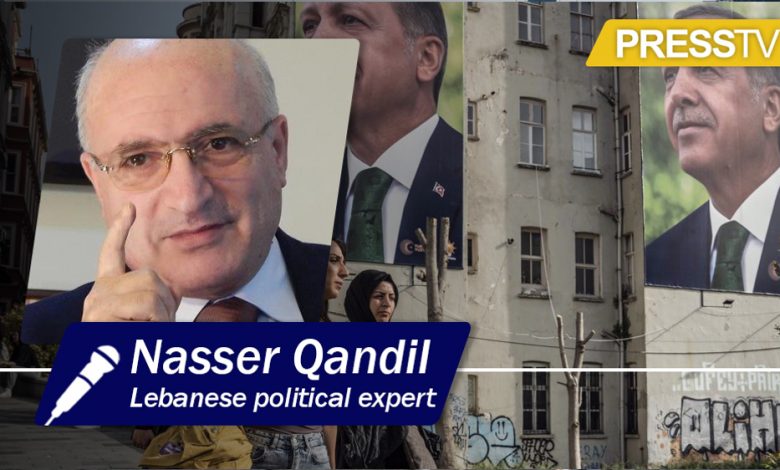Analyst Warns Erdogan’s Interference in Syria, War Fallout Will Have Steep Cost for Voters in Terms of Anger
According to a Lebanese political expert, Recep Tayyip Erdogan did not receive much backing from urban populations in the recent election, largely as a consequence of his meddling in Syria and the impacts of his involvement in the conflict.

In an interview with Press TV, Nasser Qandil, editor-in-chief of Lebanon’s al-Binaa newspaper, pointed out that many youths in urban areas did not cast their ballots for Turkish President Recep Tayyip Erdogan, who has been in power for more than two decades, with the rallying cry of “20 years is enough.”
He stated that the Syrian refugee issue and Erdogan’s involvement in the Syrian conflict were among the causes of the decline in his votes in urban areas.
His rival has promised to transfer refugees to their country within two years, and, if necessary, deport them.
Erdogan was victorious in the presidential race on Sunday, earning 49.5% of the vote, while his opponent, Kemal Kilicdaroglu, received 44.9%.
Since neither candidate attained the required 50 percent of votes to win outright, a runoff election will occur on May 28.
In the 2023 presidential contest, Erdogan received fewer votes than he did in 2018.
Qandil declared that Erdogan will confront numerous difficulties in the second election, including the considerable economic and social expenses of Syrian refugees living in Turkey, the increasing joblessness rate, the rent increase, and the escalating rivalry between Turkish and Syrian employees.
He suggested that, with the backing of Russia, Iran, and Persian Gulf states, Erdogan could devise a plan for a two-year period of Turkish withdrawal from Syria, repatriation of refugees, and the elimination of terrorists from Syria’s north and east regions.
Unless Erdogan plays his trump card bravely and expresses his willingness to create a timeline for Syrian refugees to return, the second round may offer better chances to his adversary.
For more than 10 years, Turkey has supported militants in the fight against Syrian President Bashar al-Assad’s government and dispatched its own troops to Northern Syria.
In recent months, the US-led NATO member, which is strategically located, has taken measures to restore normal relations with Syria.
In the interview, the Lebanese political analyst compared Erdogan to Kilicdaroglu, noting that the president symbolizes a political religion that is close to the West, whereas Kilicdaroglu stands for the pro-Western and anti-religious secular movement.
He argued that Erdogan focuses on political and economic ties with other nations, whereas his rival prefers for Turkey to take on a regional role, staying away from war and expansionism.
Qandil further highlighted Erdogan’s success in constructing a nationally-oriented economy, in contrast to Kilicdaroglu’s inclination towards the United States, which has resulted in attempts to implement liberalism, reduce the government’s involvement in the economy, and legalize same-sex relationships.
Erdogan reported that the suburbs had a favorable opinion of him due to their preference for an Islamic national identity that was in keeping with the area and their disapproval of Europe’s prejudiced attitude towards Turkey’s quest for EU membership.







